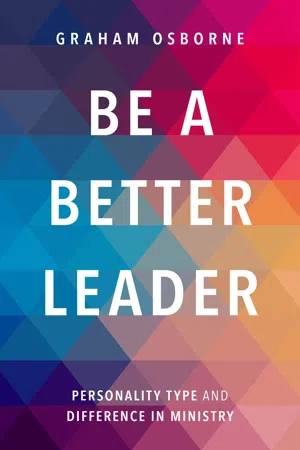
- English
- ePUB (mobile friendly)
- Available on iOS & Android
About This Book
The purpose of this book is to enable Christian leaders to understand their psychological type, using the MBTI (Myers-Briggs) personality indicator, and to use this information to generate new insights into their own experience and performance. It will enable leaders to develop better strategies to maximise their strengths and to work with their recognised weaknesses.
A significant amount of stress is experienced by Christian leaders. This book will help them to focus on those aspects of their work that are energising and life-giving. Part One of the book introduces the theories of psychological type and how these apply to Christian leaders.
Part Two include detailed profile descriptions of each of the 16 MBTI personality types and explores the 'comfort zone' for that type and difficulties experienced by that type 'outside of the comfort zone.' Each type description is written with the role of the Christian leader in mind and covers aspects of their role, eg their experiences of worship, prayer, pastoral responsibilities, administration and working with others.
Frequently asked questions
Information
PSYCHOLOGICAL
TYPE THEORY
- Gordon Allport, who focused his studies on psychologically healthy individuals: ‘Personality is the dynamic organization within the individual of those psychophysical systems that determine his characteristic behavior and thought.’1
- Robert Stephen Weinberg and Daniel Gould in Foundations of Sport and Exercise Psychology: ‘the characteristics or blend of characteristics that make a person unique’.2
- Oxford Dictionaries online: ‘The combination of characteristics or qualities that form an individual’s distinctive character’.
- The Collins English Dictionary: ‘the sum total of all the behavioural and mental characteristics by means of which an individual is recognized as being unique’.
- Merriam-Webster online dictionary: ‘the set of emotional qualities, ways of behaving, etc., that makes a person different from other people’.
- American Psychological Association: ‘Personality refers to individual differences in characteristic patterns of thinking, feeling and behaving. The study of personality focuses on two broad areas: One is understanding individual differences in particular personality characteristics, such as sociability or irritability. The other is understanding how the various parts of a person come together as a whole.’3
Table of contents
- CoverImage
- Title Page
- Imprint
- Contents
- Illustrations
- Foreword
- Introduction
- Part 1: Introducing psychological type theory
- Part 2: 16 types of Christian leader
- Taking it further
- Notes
- Further reading